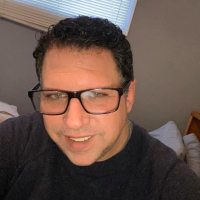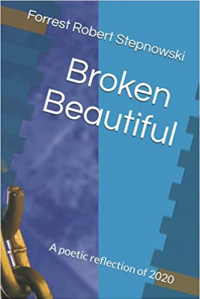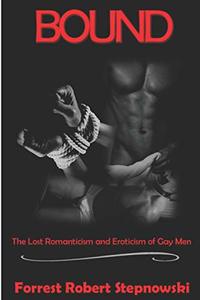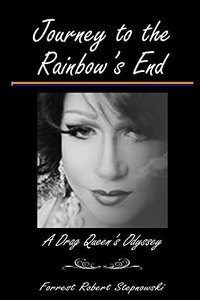Forrest Robert Stepnowski Interview Published on: 18, Mar 2021
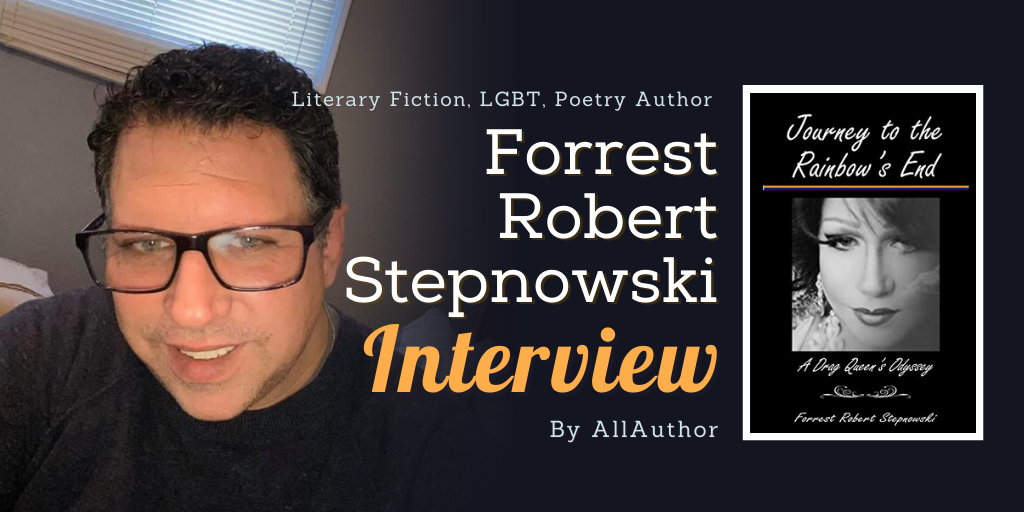 Which is your favorite childhood memory?
Which is your favorite childhood memory?
One of my favorite childhood memories would be the ones surrounded by music and performing. My childhood was not the best. Filled with abuse, isolation, depression, and anxiety. I came from what some would call a broken and dysfunctional family. The moments I was able to escape it all was related to music. Singing, playing the trumpet or string bass, or even acting in a theatrical production. These are the memories that helped me find joy and comfort and escape the reality that was prevalent during my childhood.
Do you remember the first book you ever read? What was it about?One of the first books I remember reading in my earlier childhood days was “Where the Wild Things Are” by Maurice Sendak. The story line was about a young boy who felt alone and acted out in aggressive ways towards others. He felt alone and isolated. I could relate to this character very much, without acting out, however. I lived vicariously through the main character, “Max”. When I became a little older, I took a liken to the author J. R. R Tolkien and his books “The Hobbit” and “The Lord of the Rings”. Again, I found empowerment in the main character, “Frodo Baggins”, who was judged and labeled weak and worthless. The character found his strength and voice as the story line progressed.
Which of your childhood dreams was the first to die?One I was younger, my first dream was to become an English language and theatrical arts teacher. Unfortunately, I listened to people who told me that I did not have a chance in making this dream come true. One of these people was my sophomore high school English teacher. She identified me as different and wanted me to be aware of such every day she saw me.
What is the toughest case you've had as a social worker?My specialty as a social worker is behavioral health care for those who suffer neurocognitive disorders and mental illness. Most of my clients are people who were institutionalized for most of their adult life, but now suffer with a form of Dementia. Most of the people in my care have had troubled childhoods and adulthoods, falling through the cracks of the mental and healthcare system. One of the toughest cases I have ever dealt with was related to an individual who had dual diagnosed mental illness and dementia at a very early age; this client was 34 years old. He had a rare condition that would cause multiple strokes and brain bleeds, causing him to lose control of his cognitive and physical abilities. He attempted to commit suicide multiple times during the early stages of his condition. He had small children and a wife who loved him unconditionally, however, he did not want his legacy to be the man he’d become. He wanted his family to remember him as the vibrant husband and father he was prior to the illness.
What are the things you shouldn't say to a performing artist?There are multiple things you should not say to a performance artist, specifically artists who perform as “drag queens” or “female impersonation”. One questioned that irritated me the most was “Do you want to be a woman?” When I would respond that the artform is only for entertainment and performance, they would act surprised. They could not understand that I actually am fine with being a man but have an artform that I enjoyed doing for many years to support my community and local charities. I have recently retired for being a performance artist due to the recent spread of the Covid-19 virus.
Since how long have you been a Fresh Ink Group Author member?I have been a proud member of Fresh Ink Group for almost a year now. I find these individuals supportive, and helpful to all writers who are trying to break through the ceiling of literary arts.
What challenges did you face while writing the book, BOUND: The Lost Romanticism and Eroticism of Gay Men?That is a great question. What started this book was a discussion I had with a few people in the LGBT community. They challenged me to write poetic works that were on the erotic end of the spectrum. The challenge I faced was, how to stay authentic to my own literary voice. I have never been one who wrote erotic prose or poetry in the past. I was uncomfortable with the thought to tell you the truth. Instead of writing a body of works that was considered pure eroticism, I wanted to create something that evaluated the lost art of romanticism and loving relationships. We live in a very technological era where people hook up in this country at the click of a button, or a swipe of a finger. I call it the Grindr years. “BOUND” was created to explore the fantasies, romance, and yes, even erotic desires many in the LGBT community wish for or desire, especially in the culture of gay men.
What is the best experience you had by putting yourself out of your comfort zone?The best experience I have had by putting myself and my work out there is the connection my work has made with many people internationally. To be an openly gay male or any LGBTQ identity for that matter, can be challenging. Some families are more supportive than others, but some people are disowned and thrown to the streets for not fitting the heteronormative picture of society. Even in the United States, depending on where you are growing up or where you are from, there are many who continue to stay in that metaphorical closet instead of embracing who they truly are. I have received emails and messages from many people from all over the world stating that my work gave them hope. Especially from my first poetry book, “Journey to a Rainbow’s End”. In this collection, I am allowing my most intimate and vulnerable moments in my life to be out there for everyone to read. Call it a poetic memoir for lack of a better term. The fact my written words are helping others find their own voice and truth, is the best compliment and consolation of breaking out of my comfort zone I could ask.
How did you come up with the idea for your book, MY Journey to the Rainbow's End?“MY Journey to the Rainbow’s End” was created as part of the original collection “Journey to the Rainbow’s End” anthology. This short story was inspired by the poetic works I wrote when I was between the ages of 12-17 years old. This is the point of my life where I discovered poetry as a form of therapy. I found these years being the hardest for me, so I hoped some of these experiences shared would help others going through the same journey. You see, it’s not just MY journey I am writing about. It’s a collection of all of our journeys coming together. We all have a moment in our lives where we feel ostracized and labeled as “different”, and being different is not widely accepted or supported, which causes many increased depression and suicidal thoughts. “MY Journey to the Rainbow’s End” was created to show that “life gets better”, as we become wiser and focused on being our authentic selves.
What are some things that have changed after being an author? Do you miss anything?The only real part of my life that has changed is that my written words are now out there for all to see. I have always written bodies of work but was too afraid of sharing them with the world, until a few years ago. I am lucky to say that I am not missing anything since becoming an author.
Which option do you prefer, reading some books or watching movies adapted from them?My first preference is to read books over watching the cinematic version of the book. The book is usually 100% better than the movie anyways. There have been a few movies where they were improvements of the original story live, but in an effort not to create a “literary war” I will keep the titles of those books and movies to myself. LOL
What kind of audience do you hope to appeal to with your books?I hope to attract a diverse audience where it does not matter if you are gay or straight. Where it does not matter what ethnicity, religion, or political identity is. I hope all find a positive message in my work. I know there will be many who are opposed to the content of my books, but I hope they find the humanity I am portraying in the various topics I am addressing.
What behind-the-scenes tidbit in your life would probably surprise your readers the most?I think many would be surprised by my work life and passion to provide care of those who are invisible and vulnerable. They may also be surprised by the political advocacy work I have done. These are not topics I readily write about in my books. They may also be surprised that I used to advocate against gay rights when I was much younger. This was before I addressed my own feelings and struggle of being a gay male myself. As a lot of my writing addresses a struggle of being honest and authentic with one’s self, I grew up in a religious household where I was told I could change this part of me. In my own coming of age, I learned that I was born this way and have learned to accept it.
Can you tell us about your current projects? When can the readers expect your next book in print?I have a few projects I am currently working on. The main project is a collection of poetic works that addresses the political and health status in the United States during the year 2020. The poetry in this book brings critical thinking to those who read it. There are words of hope, and reflection; pieces that should touch the soul and hearts of all who read them. The title of this book is called “Broken Beautiful” and it will be out later this year during the Spring.
How has your experience with AllAuthor been?I would highly recommend AllAuthor to all up and coming writers, published or not. This group of people and artists are supportive of everyone in its membership. I would also recommend AllAuthor for people who have a passion to read incredible books from diverse authors and literary artists. AllAuthor has also brought many opportunities my way than I ever expected.
Share Forrest Robert Stepnowski's interview
An advocate, writer, and social worker, Forrest Robert Stepnowski wanted to become an English language and theatrical arts teacher when he was younger. He has been a proud member of Fresh Ink Group for almost a year now. His book, “MY Journey to the Rainbow’s End” is created to show that “life gets better”, as we become wiser and focused on being our authentic selves.
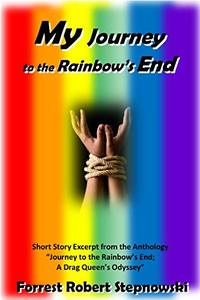 MY Journey to the Rainbow's End: (Full Short Story from “Journey to the Rainbow’s End; A Drag Queen’s Odysseyâ€)
Genre: Literary Fiction, LGBT
MY Journey to the Rainbow's End: (Full Short Story from “Journey to the Rainbow’s End; A Drag Queen’s Odysseyâ€)
Genre: Literary Fiction, LGBT
